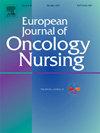医疗保健专业人员对老年结直肠癌患者衰弱评估的看法:一项定性研究
IF 2.7
3区 医学
Q1 NURSING
引用次数: 0
摘要
目的探讨门诊医疗保健专业人员(HCPs)对老年人结直肠癌(CRC)标准化虚弱评估的价值和实践的看法。在目前的实践中,虚弱评估包括使用G8测量进行初始虚弱筛查,然后进行综合老年评估(CGA),以进一步评估筛查期间检测到的虚弱。方法采用半结构化访谈的定性研究方法,于2023年2月至7月对17名医护人员进行访谈。要求肿瘤学、外科、胃肠病学和老年病学的医生以及一家大型教学医院门诊的护士和执业护士参与对结直肠癌患者的虚弱评估。结果出现了两个主要主题:1)G8测量对虚弱筛查的感知价值和2)CGA的感知价值。讨论了G8和CGA的时刻、内容和结果。讨论的其他问题包括脆弱性评估的复杂性和卫生保健提供者之间的合作。观点的综合证明对脆弱性评价的总体附加价值是重要的。CGA被认为对怀疑有认知障碍或不确定虚弱程度或不确定最佳治疗的患者最有益。结论:G8不适合作为该人群的筛查工具。如果在做出治疗决定之前进行CGA,并将其整合到有效的多学科途径中,重点是包括与患者在内的协作决策,则CGA可以增加特定患者子集的价值。本文章由计算机程序翻译,如有差异,请以英文原文为准。
Perspectives of healthcare professionals on frailty assessment among older patients with colorectal cancer: A qualitative study
Purpose
Exploring the perspectives of healthcare professionals (HCPs) working at the outpatient clinic on the value and practice of standardized frailty assessment in older adults with colorectal cancer (CRC). In current practice, frailty assessment comprises initial frailty screening using the G8 measurement, followed by a comprehensive geriatric assessment (CGA) to further evaluate frailty detected during screening.
Methods
This is a qualitative study involving semi-structured interviews with 17 HCPs, conducted from February to July 2023. Physicians specializing in oncology, surgery, gastroenterology, and geriatrics were asked to participate as well as nurses and nurse practitioners at the outpatient clinic of a large teaching hospital involved in frailty assessment of patients with CRC.
Results
Two main themes emerged: 1) the perceived value of the G8 measurement for frailty screening and 2) the perceived value of the CGA. The moment, content, and outcome of the G8 and CGA were discussed. Other issues discussed were the complexity of frailty appreciation and collaboration between HCPs. The integration of perspectives proved important to the overall added value of frailty assessment. The CGA is considered most beneficial in patients with suspected cognitive impairment or if there is uncertainty about the degree of frailty or about the optimal treatment.
Conclusion
We conclude that the G8 is not an appropriate screening instrument for this patient population. CGA adds value in a specific subset of patients if it is conducted before treatment decisions are made and integrated into an efficient, multidisciplinary pathway, focusing on collaborative decision-making, including with the patient.
求助全文
通过发布文献求助,成功后即可免费获取论文全文。
去求助
来源期刊
CiteScore
4.40
自引率
3.60%
发文量
109
审稿时长
57 days
期刊介绍:
The European Journal of Oncology Nursing is an international journal which publishes research of direct relevance to patient care, nurse education, management and policy development. EJON is proud to be the official journal of the European Oncology Nursing Society.
The journal publishes the following types of papers:
• Original research articles
• Review articles

 求助内容:
求助内容: 应助结果提醒方式:
应助结果提醒方式:


